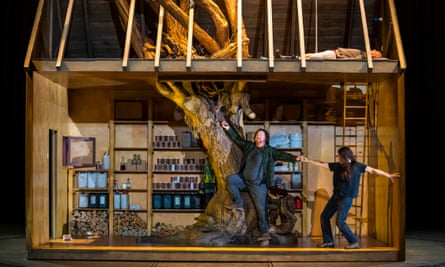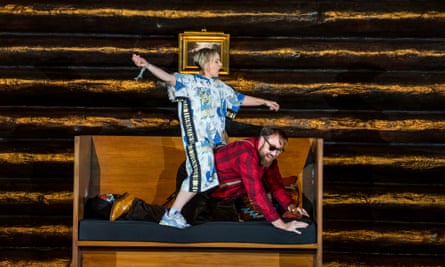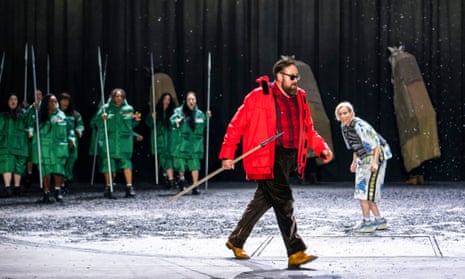English National Opera’s The Valkyrie marks the start of the company’s new Ring cycle, conducted by Martyn Brabbins and directed by Richard Jones. The opening night, however, had its fair share of troubles. Days beforehand, for starters, Westminster Council vetoed the use of flame effects in the last act on safety grounds. Annilese Miskimmon, ENO’s artistic director, accordingly asked the audience to use their imaginations, as Wagner would perhaps have wished. The production is itself, however, notably uneven, and the fire-less final scene felt anticlimactic at the end of what was ultimately a far from fulfilling evening.
This is Jones’s second Ring for London, and though magic-realist noir has now replaced the absurdism of his 1995 Covent Garden cycle, his starting point for Valkyrie remains the same, with Sieglinde (Emma Bell) casting spells to summon Siegmund (Nicky Spence) into her life through a trapdoor in the floor. Stewart Laing’s designs suggest a dying, post-apocalyptic world, where humanity exists alongside sinister anthropomorphic creatures, Wotan’s ravens among them, and black ash falls repeatedly from the sky. Hunding (Brindley Sherratt) keeps Sieglinde confined in a wooden shack, while Matthew Rose’s hot-tempered Wotan and Rachel Nicholls’s Brünnhilde (dressed to resemble a younger Billie Eilish) hang out in what seems to be its upmarket equivalent. Fricka (acted by the indisposed Susan Bickley on opening night, while Claire Barnett-Jones sang from the wings) is tellingly out of place here, with her airs, graces and urban glamour.

Some of it is striking: Hunding’s brutality towards Sieglinde is truly horrific; a film of Alberich (usually unseen in Valkyrie), plotting and conniving, accompanies and intensifies Wotan’s Act II narration; and Siegmund recognises Wotan as his father as he dies, a shockingly poignant moment. Elsewhere, however, there are lapses: Hunding has acquired a gang of henchmen, who hang around too long in Act I, deflecting attention from Spence’s central narration; actors in equine headgear make entertaining Valkyrie horses, but Jones also has Grane shuffling about through the closing scene, a major distraction; and, for some inexplicable reason, a solitary figure does a Riverdance routine during the opening moments of the Ride of the Valkyries.
The unevenness, however, is as much musical as theatrical, for which Brabbins bears some of the responsibility. The playing is superbly detailed, but interpretatively there is too little tension in too many places, and some erratic speeds. Act I is slow and muted rather than exciting and erotic. Wotan’s Farewell, in contrast, seems almost rushed. Act II fares best, with Wotan’s narration urgently done and the emotional gradations of the Todesverkündigung carefully plotted.

The cast isn’t always helped by an awkward new translation by John Deathridge, that can pull against the accentuations of the vocal lines, though there are some strong performances. Spence, singing with an apology for a cold, makes a fine Siegmund, noble, anguished and touching. Rose, for whom Wotan lies fractionally high, is powerfully intense in Act II, but tires a bit by the end. Nicholls subtly judges Brünnhilde’s gradual involvement, moral and emotional, with the humanity that she will one day join. Her metallic tone offsets Bell’s greater warmth, though we don’t hear enough of the latter’s words. Sherratt’s Hunding is unspeakably malign, and effectively having two Frickas reminded us what a superb singer Barnett-Jones is becoming and what a wonderful stage animal Bickley can be. A flawed evening, its parts not adding up to a satisfactory whole.
In rep at the Coliseum, London, until 10 December

Comments (…)
Sign in or create your Guardian account to join the discussion